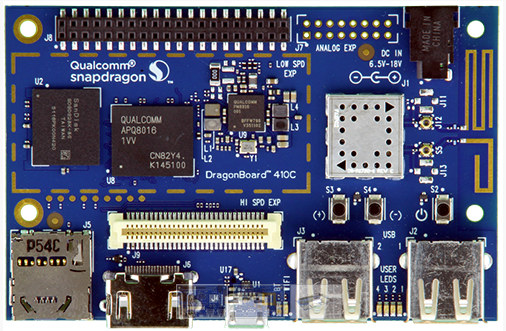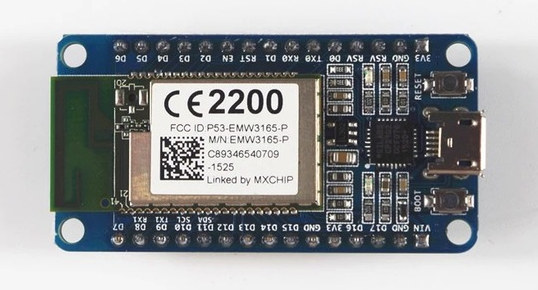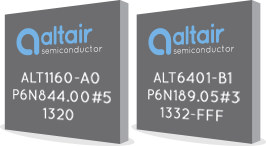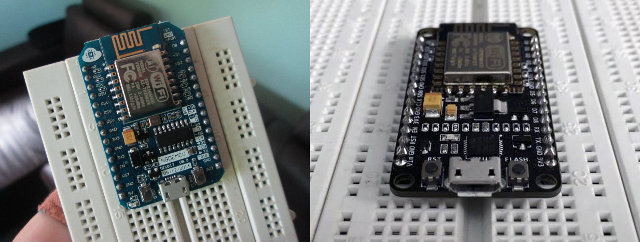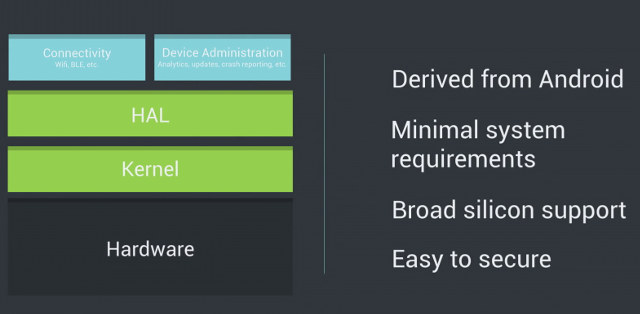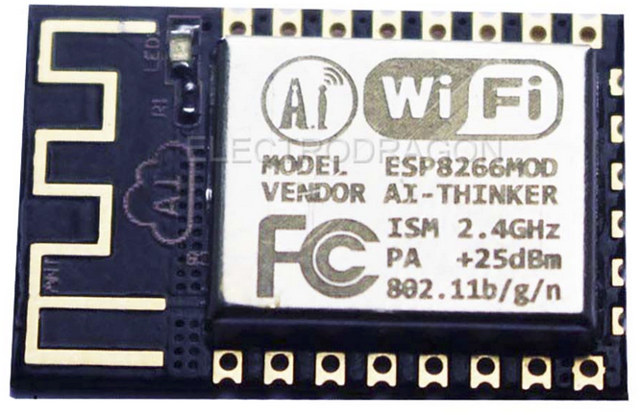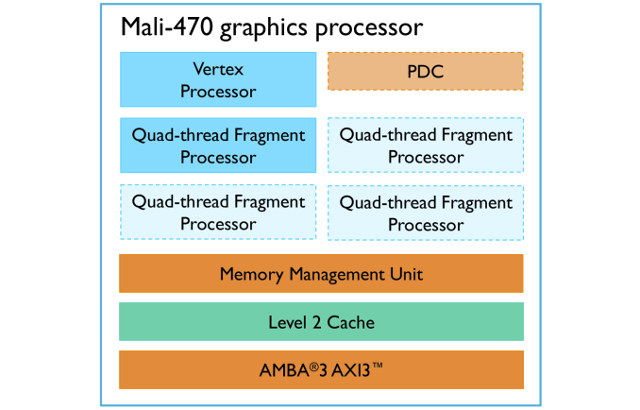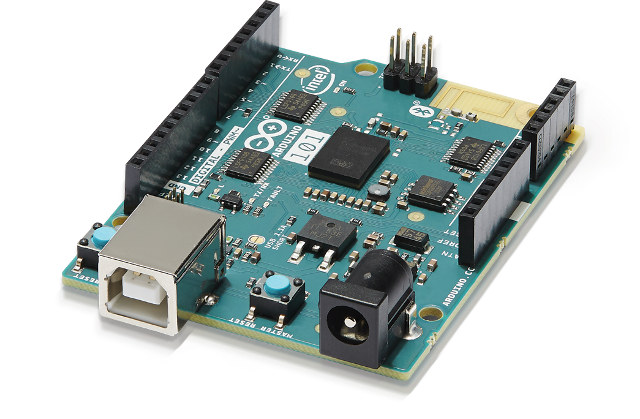Microsoft announced Windows 10 IoT Core for Raspberry Pi 2 and Minnowboard MAX boards a few months, and now the company has added a new ARM board to their Windows 10 IoT program with the soon-to-be-available Qualcomm DragonBoard 410c development board compliant with 96Boards specifications. Windows 10 IoT Core for DragonBoard 410c adds support for onboard WiFi and Bluetooth, as well as DirectX graphics on top of features already supported on the Raspberry Pi 2. To get started, you’ll need a computer running Windows 10, and follow DragonBoard’s Winfows 10 IoT Core guide. I assume most people familiar with Linux operating systems won’t suddenly jump ship to run a Windows operating systems, but Windows developers who got used to work with Visual Studio may be more comfortable with Microsoft’s environment. Out of curiosity, I’ve checked out if anybody had done any project with Windows 10 IoT core, and was surprised […]
$10 WiFiMCU Board is a NodeMCU Clone Based on EMW3165 Module
Yesterday I wrote a short tutorial for NodeMCU board, and one visitor mentioned WiFiMCU board that has a similar form factor as NodeMCU, and while it is more expensive at about $10 on Aliexpress or Ebay, it is also more powerful and provides more I/Os thanks to its EMW3165 module including an STM32 Cortex M4 micro-controller with 128KB RAM, 512KB flash, a Broadcom WiFi module, and 2MB SPI flash. WiFiMCU specifications: MCU – STMicro STM32F411CE Cortex-M4 microcontroller @ 100MHz with 128KB RAM, 512KB flash Storage – 2MB SPI flash WiFi – Broadcom 802.11 b/g/n RF Chip: Modes – Station, Soft AP and Station+Soft AP Security – WEP, WPA/WPA2, PSK/Enterprise 16.5dBm@11b, 14.5dBm@11g, 13.5dBm@11n Receiver sensitivity – -87 dBm 2x 15-pin headers with 17x GPIO Pin 3x UARTs 5x ADC, 1x SPI, 1x I2C, 1x USB SWD debug interface 11x PWM Misc – Boot and Reset buttons Power Supply – 5V via […]
Altair FourGee LTE Chipsets Promise 10 Years of Connectivity with AA Batteries for IoT Applications
Connectivity achieved with GSM,. 3G or LTE (4G) cellular networks is great for long distances, but usually costs and power consumption are too high for IoT or M2M communications, which explains why there are competing long range low power WAN standards such as Sigfox, LoRA or Weightless. Altair Semiconductor introduced two new LTE SoCs, namely FourGee-1150/6410 and FourGee-1160/6410 a few months ago, supporting respectively LTE Cat-0 and Cat-1 connectivity, and promising up to 10 years of battery life on AA batteries for smart meters, wearables, security alarms, city lightings, etc… Altair FourGee-1150 and FourGee-1160 key features and specifications: Processor – Multiple MIPS M5150 “Warrior” MCU cores LTE Connectivity FourGee-1150 LTE Release 12 Category-0 (1Mbps / 1Mbps), software upgradeable for supporting Release 13 features Integrated VoLTE/IMS/OTA-DM functionality FourGee-1160 LTE Release 11 Category-1 (10Mbps / 5Mbps), software upgradeable for supporting Releases 12 and 13 features Integrated VoLTE/IMS/OTA-DM with HD voice functionality Software […]
Getting Started with NodeMCU Board Powered by ESP8266 WiSoC
Since ESP8266 is now so popular, I’ve recently bought a NodeMCU board to try it. I selected this board because the latest version of the board is breadboard-friendly, integrates a USB to serial chip, and it can be powered by a simple USB to micro USB cable. I also noticed a ESP8266 tutorial with NodeMCU firmware by SwitchDoc Labs the other day (using ESP-12 and Adafruit Huzzah), which I applied to my NodeMCU board, but since I encountered a few issues, I decided to report my findings, and write my own little getting started guide to switch on/off LED and GPIOs using a web interface. NodeMCU v0.9 and NodeMCU v1.0 If you are going to purchase a NodeMCU board it’s important to know there are two official versions: NodeMCU v0.9 with ESP-12 module NodeMCU v1.0 with ESP-12E module The main complain about NodeMCU v0.9 is that while it fits on […]
Brillo Android based OS for IoT Projects Supports ARM, Intel and MIPS Platforms
You’d think there are already enough lightweight operating systems that could provide a good enough platform for IoT and embedded projects, but Google decided to make their own Brillo operating system for IoT, based on Android, most probably to leverage the existing Android tools, and make it easier for app developers to move to the Internet of Things space. Brillo ‘s hardware requirements are pretty low as the operating system can run on devices with 32MB of RAM, and 128MB of storage. Google will provide a complete ecosystem with an embedded OS, core services, and a developer kit with tools to build, test, and debug. Just like in Android, three architectures will be be officially supports, starting with the following hardware platforms: ARM – TechNexion Pico-i.MX6UL system-on-module based on Freescale i.MX6 UltraLite and Broadcom BCM4339 802.11ac + Bluetooth 4.0 wireless module, combined with PICO-DWARF baseboard. MIPS – Upcoming MIPS Creator […]
ESP-14 WiFi Module Combines ESP8266 with STM8S MCU
ESP8266 WiFi modules can be purchased for less than $3, while some STM8S 8-bit MCUs board sell for just above $1. A.I. Thinker decided to combine both by adding an STMicro STM8S003 micro-controller to ESP-12E module and called that ESP-14. ESP-14 specifications: WiSoC – Expressif ESP8266-EX WiSoC MCU – STMicro STM8S003F3P6 8-bit MCU @ 16 MHz with 1KB RAM, 8KB flash, and 128 bytes EEPROM Connectivity – 802.11 b/g/n WiFi I/Os – STM8: 15 GPIOs also supporting I2C, SPI, UART, and up to 5 10-bit ADC ESP8266: E_GPIO0 to select operating mode (running or download) Power Supply – 3.3V Power Consumption – System Standby mode 70 mA; 0.5 μA shutdown @3.3V Dimensions – 24 x 16 mm STM8S controls ESP8266 by AT commands, and all but one of the I/Os are directly connected to STM8S. I can see at least two advantages: 5 ADC inputs are available, and for battery […]
ARM Introduces Mali-470 GPU for Wearables, IoT and Embedded Applications
Mali-400 was announced in 2008, and since then has been used in various SoCs for smartphone, but now it’s mostly replaced by Mali-450 GPU in low cost mobile and STB SoCs, although Mali-400 is still being implemented in new SoCs such as Rockchip RK3128 processor. ARM has been working on a lower power version of the GPU, and just unveiled Mali-470 GPU targeting wearables, as well as embedded and IoT applications. Mali-470 GPU is said to use the same memory and AMBA interfaces as Mali-400, while keeping some of the improvements brought to Mali-450 GPU, and further lowering power consumption to just half of that Mali-400 in terms of mW per frames per second. Just like its predecessors, Mali-470 supports OpenGL ES 2.0, and like Mali-400 it will scale from 1 to 4 fragment processor, always combined with one single vertex processor. Mali-470MP1 is likely to be used in wearables […]
Arduino 101 Board Features Intel Curie Module, Bluetooth LE, and Sensors
I’ve recently learned that the battle between the two Arduino teams, namely Arduino SRL (arduino.org) in Italy, and Arduino LLC (arduino.cc) in the US, had taken another turn with Arduino LLC now branding their boards as Arduino in the US, and Genuino in the rest of the world. This may certainly bring confusion to new comers, especially as they have to deal with different version of the Arduino IDE. With that backdrop, Arduino LLC has now introduced Arduino 101 (aka Genuino 101) board powered by Intel Curie module with Quark SE x86 SoC with Bluetooth LE and a 6-axis combo sensor. Arduino 101 specifications: SoC – Intel Curie compute module including an Intel Quark SE x86 32-bit microcontroller @ 32 MHz and an a DSP sensor hub @ 32Mhz with 384 KB flash, 80 KB SRAM (24KB available for sketches), , Bluetooth LE, and 6-axis combo sensor with accelerometer and […]


